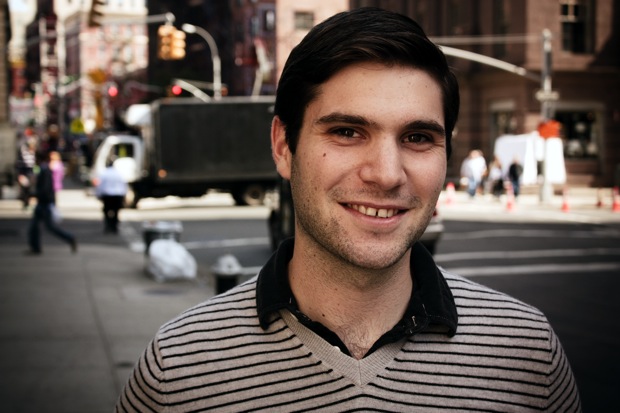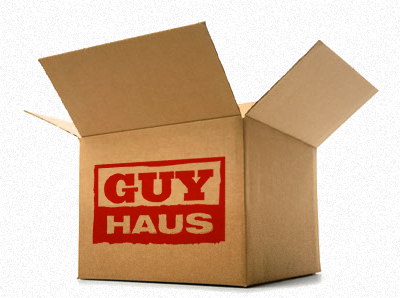
There's serial entrepreneurship--when someone starts company after company, handing over the reins at a certain point to focus again on the early stages of building a business. Then, there's simultaneous entrepreneurship, which involves starting and running several, not-necessarily-related ventures at once.
Two famous examples of the simultaneous startup CEO are Jack Dorsey, with Twitter and Square, and Bill Gates, who ran the photography business Corbis alongside Microsoft. Now, a host of upstarts (like Citelighter, a company we wrote about in August) are trying to make this method work, sometimes financing one business with profits from the other.
Jesse Middleton is the CEO and cofounder of three emerging startups in New York: GuyHaus, a subscription-based, product delivery service for guys that's frequently compared to Birchbox; GetMinders, a service that helps seniors, or anyone, adhere to their medical regimen through phone and text reminders; as well as WeWork Labs, a co-work space which New York Magazine recently called the "Best Shared Office Space" in New York City.
Leisure, it would seem, cannot exist in Middleton's world. But for the 25-year-old CEO, running simultaneous startups is not a sign of workaholism; it's a way of allowing his small businesses to collaborate, and share some resources, thereby saving him time and money throughout their stressful early stages.
As a result, Middleton says he's free to indulge in his lifelong passion, sailing. (He has a 27-foot Catalina and sails mostly off the coast of Maryland.)
Fast Company caught up with Middleton in San Francisco recently, where he was meeting with potential investors and business partners. Here's what Middleton revealed about the benefits of entrepreneurial multi-tasking...
 FAST COMPANY: You came up with the idea for GuyHaus in March and it's already funded. How did it pick up steam so quickly?
FAST COMPANY: You came up with the idea for GuyHaus in March and it's already funded. How did it pick up steam so quickly?
JESSE MIDDLETON: There are many reasons, but it really comes down to the people involved and whether there's an existing interest for the product. Investors invest in the early stage, when there's no product to be seen. But if they see that an idea is part of an emerging group-buying trend…investors will come along and say, "You guys are a solid team, and other people are doing this successfully, so I believe in it." Subscription commerce is an area people are very excited about right now. Companies like ShoeDazzle and Birchbox are starting up and succeeding. So, by taking that model and grabbing another vertical, you create an exciting spot to invest in.
We believe that out of the $21.7 billion men's grooming industry, there's a very large subset of consumers that don't really want to have to think about their shopping needs on certain essentials. As more people streamline their lives, live on their smartphones and spend more time online, shopping will change to follow suit, becoming simpler and more effective to just subscribe to and buy these goods online.
How is GuyHaus different than BirchBox?
Men don't like to shop. We like to be in and out. Where Birchbox delivers a variety of different samples for women to test and try out, GuyHaus focuses on essential items. Men come to GuyHaus and say, "I need shower stuff, skin-care stuff, and shaving stuff." They don't want to experiment with 15 sticks of deodorant. Even though taking a few trips a month to [the drugstore] may not sound like such a big deal, it does take time out of your life. It's a stress point. And it doesn't have to be.
What's the response been so far?
We raised our first round of funding just three and a half months ago. Michael Oliver, Andrew Sternthal, and myself cofounded GuyHaus and raised our first round of funding about four months ago. We raised $250,000 from a great group of angel investors including Michael Yavonditte, Charles Smith, Jason Yeh, and Michael Edwards with InitioGroup.
We haven't had any cancellations from a customer yet! I assumed everyone would get their boxes the first month and say: "What the hell is this?" But that hasn't happened. The feedback we're getting tells us we're on the right track. But we're not there yet.
You have described yourself as a "lifehacker." How does your interest in personal efficiency apply to your other business ventures?
In my own life, I'm always looking to make certain experiences better and easier. I'm definitely not like Tim Ferriss, author of The Four Hour Body, who went so far as to embed censors in himself to monitor his every move. But what I look for is: What are the repetitive, mundane tasks in my life that I can improve? Years ago, I wrote an app called HitMeBack. You text us something you need to remember in a number of hours, and then we hit you back at that time with the message. Sounds simple. But those are the sorts of things that excite me when it comes to technology: the simple ways that we can improve our life.
Where does WeWork Labs, which opened officially in April, fit in?
In the same way I like to streamline my life, WeWork Labs helps early stage entrepreneurs streamline the creation of startup businesses. There are all these tasks that go into building a company, from software development to fundraising to marketing. If you're a few people in an office, you don't want to think about things like how to clean the space every night, or how to bring food in. If you're a developer, for example, you're concerned with finding someone to teach you about PR, or how to negotiate fundraising. WeWork puts all these people together.
The space is half membership-driven and half sponsor-driven. Our sponsors not only provide money to offset the cost of the space--so we can charge just $250 a month for members--but they also bring in services. For example, the WilmerHale law firm is providing free legal support to all 50 entrepreneurs in the space right now. Two of the partners are just there hanging out, in case anyone has any questions.
What else are you working on?
I spend time advising other little startups. I'm no expert, but I've been through the fundraising process, so I help out where I can. My main focus these days is GuyHaus, but I still work on Getminders, a [business] focused on medication adherence. The idea there is to leverage phone calls and text messaging to help people stay on track with their medication or health in general.
My grandfather doesn't have an iPhone, but he still needs to manage his medication regimens for his diabetes and Parkinson's. It works according to the same pattern: Getminders streamlines health management the way WeWork streamlines the startup process and GuyHaus streamlines e-commerce.
What are the benefits to this kind of simultaneous entrepreneurship?
Well, we don't pay ourselves out of WeWork at all. We reinvest the money back into the community, which can involve anything from launching Kickstarter projects to throwing parties. At first this may not make sense. But the amount of support WeWork has given GuyHaus has paid back a hundred-fold. Since we work out of the WeWork space, we have access to dozens of friends and connections and resources. Other companies have to spend tens of thousands of dollars on their first design pass, usually. We were able to design our current site for less than $1,000 [with the help of WeWork friends]. That was huge.
Comments